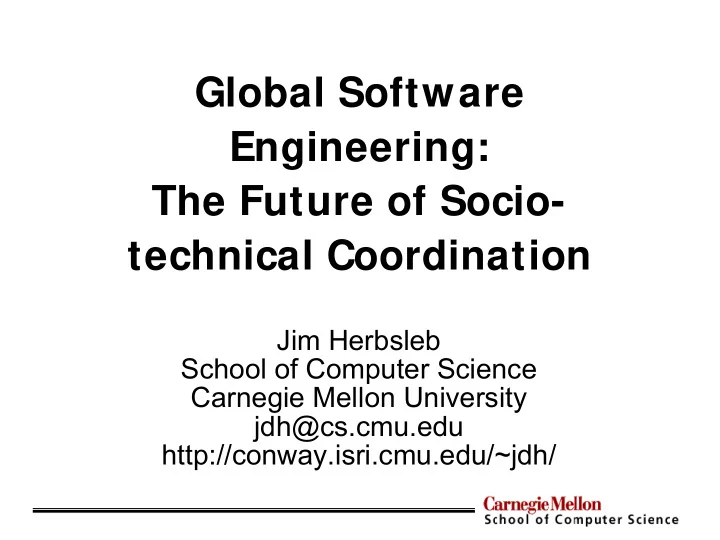

Global Software Engineering: The Future of Socio- technical Coordination Jim Herbsleb School of Computer Science Carnegie Mellon University jdh@cs.cmu.edu http://conway.isri.cmu.edu/~jdh/
Overview � Desired future state � Problems we need to solve � Research challenges − Software architecture − Eliciting & communicating requirements − Environments and tools − Orchestrating global development 2
Where We Want to Be . . . � Resource use independent of location � Effective coordination planning � Uniform understanding of requirements � Measure architecture/organization “fit” − Have rich set of tactics to choose from � Effectively manage change 3
Problems of Global Development � Key phenomenon: coordination over distance � Fundamental problem: coordination mechanisms disrupted in distributed projects � Coordination mechanisms − Based on agreements or contracts − Based on communication � Distance − Much less communication − Less effective communication 4
Research Challenges: Software Architecture � Software dependencies and task dependencies � Measuring architecture/organization “fit” − Can this organization produce software that conforms with this architecture? − Analogous to “design for manufacturability” � Tactics for improving “fit” − Adjust organization − Adjust architecture 5
Research Challenges: Eliciting and Communicating Requirements � Anticipating the need to support negotiation − Predicting the amount of requirements change − Identifying who is affected � Media for requirements communication − What needs to be face-to-face? − What mix of voice, video, messaging, tool- mediated communication? − Use of formal or diagrammatic representations? 6
Research Challenges: Environments and Tools � Virtual co-location − Informal communication − Awareness � Continuing to exploit project memory � Enriching project memories − What other data belongs in the memory? − How to balance privacy issues with utility? � Project history and collaborative tool infrastructure − Potentially huge amounts of data − Integration, interoperability 7
Research Challenges: Orchestrating Global Development � What practices are effective when? E.g., − Up front investment in design, process, architecture − Focus on agility, flexibility, communication � Interactions among practices, e.g., − Can I reduce the need for a common development environment by investing more in architecture design? − Will a defined process reduce the need for communication? 8
Conclusion � Deeper understanding of coordination in software engineering − What kinds of coordination are required? − What drives the need to coordinate? − How do we predict the needs to coordinate across a project? � Deeper understanding of coordination mechanisms − For a given project: how much to invest in coordination? − What coordination mechanisms/tactics to invest in? � Need better theories of coordination 9
Recommend
More recommend